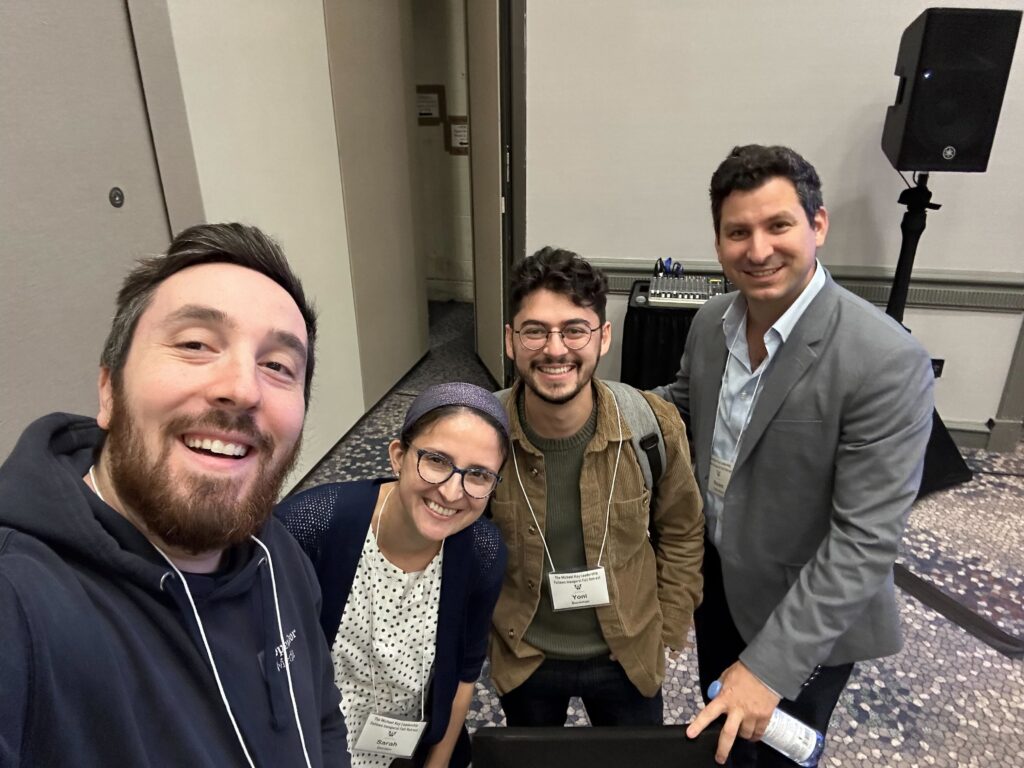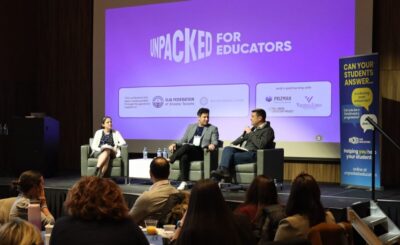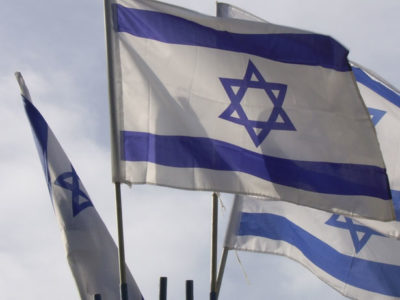Our team — Noam Weissman, Avi Posen, Sarah Gordon, and Yoni Buckman — just returned from Atlanta where we spent two days working with over 80 high school students at the Weber School for their inaugural Michael Kay Israel Fellowship retreat. Now that we are back, we wanted to share reflections from the retreat.
My wife Raizie recently looked at me and said, “You know, so many of us are just cramming.” Her point was that 10/7 happened and then so many of us, so many school leaders, so many lay leaders, so many people in general were caught educationally unprepared. “How do I answer all the questions” has been a refrain we keep on hearing. “When are we teaching about Israel?” is a question that has popped up.
While Raizie is right in many ways (she’s always right), the truth is that I also noticed the opposite, the fact that a plethora of people, school leaders, lay leaders and the like did not need to cram. Israel education and Zionism education was part of their school culture before 10/7.
One of the schools in the U.S. which was not cramming, but has been prepared all along is the Weber School in Atlanta, led by Rabbi Ed Harwitz. Rabbi Harwitz is leading a school where the vast majority of the students will be on secular college campuses in the next few years. They will be tasked with understanding and explaining the story of Zionism, the story of Israeli history and the story of the Jewish people whether they asked for it or not.
So, before summer break of this past year, he reached out to me and said, “Noam, let’s bring the Unpacked methodology and approach to the Weber school in a systematic way. Let’s have a two day retreat twice a year and focus on the toughest and most important questions about Israel. Our students need this and it’s our responsibility to provide it.”
But, Rabbi Harwitz wanted something more than that. He also wanted a curriculum and experience that was not just “pro-Israel,” (which carries with it political undertones) but was “Zionist” in nature (which is more about Jewish identity and peoplehood).
During the retreat, which has been named the Michael Kay Israel Fellowship, our education team of Avi Posen, Sarah Gordon, and Yoni Buckman facilitated a deep dive into the key elements of the Israel-Hamas war while discussing some of Zionism’s core questions, all important elements for students to develop the ability to tell Israel’s story. We unpacked the war, took a deep dive into the history of Hamas and the Gaza Strip and discussed the explosion of antisemitism on social media and how to respond to it effectively. One of the sessions we facilitated gave the students the opportunity to reflect on Israel’s establishment while unpacking conflicting narratives concerning its founding and how it relates to today’s discourse. It was also important for us to explore lessons of leadership through the life of Menachem Begin as a case study.
What follows below are some reflections from our team, from Bernadette May-Beaver, who serves as the Director of Israel and Global Education of The Weber School, and most importantly some of the students.
The future is bright. Ignore the naysayers. Our students are passionate, thoughtful, and eager to learn.
Warmly,
Noam
Avi Posen, Senior Director of Israel Education – EMEA
In such an unprecedented and challenging time for Israel and the Jewish world, spending the last few days with students from the Weber School was an important reminder that the future of the Jewish people is in great hands. The young people we worked with were curious, empathetic, critical thinkers, deeply Zionist and very committed to Israel and the Jewish nation. This time has been a stark reminder to all Jewish educators of the paramount importance of a proactive Israel education throughout the year. It’s on all of us to ensure that we give our students the knowledge and tools, regardless of what’s going on in Israel, to develop deep and meaningful Zionist identities.
Sarah Gordon, Senior Director of Israel Education – AMER
I left the Weber retreat inspired by the amazing students we met, who are passionate about Zionism and Israel, and committed to taking a leadership role around Israel on their future college campuses. I am equally impressed with the leadership of the Weber School and their willingness to invest the time and energy into creating the Michael Kay Leadership Fellowship, which shows their commitment to providing a proactive Israel education for their students. While the retreat was planned before October 7th, we were able to pivot to talking about key aspects of the Israel-Hamas war while also still discussing Zionism’s core questions, all crucial for students developing agency for telling Israel’s story. I hope other schools see the success of this program and follow suit in creating their own!
Yoni Buckman, Education Associate
In our closing session, we invited students to describe their feelings from the retreat in a single word, which we projected as a word cloud. The screen quickly filled with words like “educated,” “informed,” “knowledgeable,” and “proud.” Had I submitted my reflection too, my contribution would have been another word I saw boldly displayed: inspired. I am inspired by the emotional maturity, intellectual curiosity, and communal commitment the Weber students displayed in our sessions. After two days immersed in complex discussions inspiring dialogues with these young leaders at the Weber School, I am assured of the bright Jewish future they so aptly represent.
Bernadette May-Beaver, Director of Israel and Global Education, The Weber School
Students need and deserve an education in Israel and Zionism grounded in rigor and sophistication –an education taught in paragraphs, not in soundbites. Our inaugural retreat for the Michael Kay Israel Fellowship featured authentic learning, questioning, and reflection. It was a tremendous start. Yet breaking past social media’s negative echo chambers takes time and sustained effort, and we have much more work to do. Working with the Unpacked for Educators team of master educators was a rare privilege. Their expertise, professionalism, and unwavering dedication to excellence in Israel and Zionist education are second to none.
10th grade student
For me, the retreat was an opportunity to learn more about something I’m interested in: the history of the conflict — specifically, how it began and why it started. It helped me broaden my perspective in ways I didn’t think could happen. It’s a relevant issue that all Jewish people should be talking about.
10th grade student
This retreat helped me to understand the importance of Israel. It made me think more deeply and gain a new perspective on different opinions and biases surrounding what is occurring right now. I think it was important to gather our Jewish community together to create a meaningful learning environment about what’s important right now.
10th grade student
This retreat was very impactful for me. I appreciated the amount of new information I was exposed to and encouraged to engage with. The programming strengthened my interest and urge to be involved in Israel advocacy.




